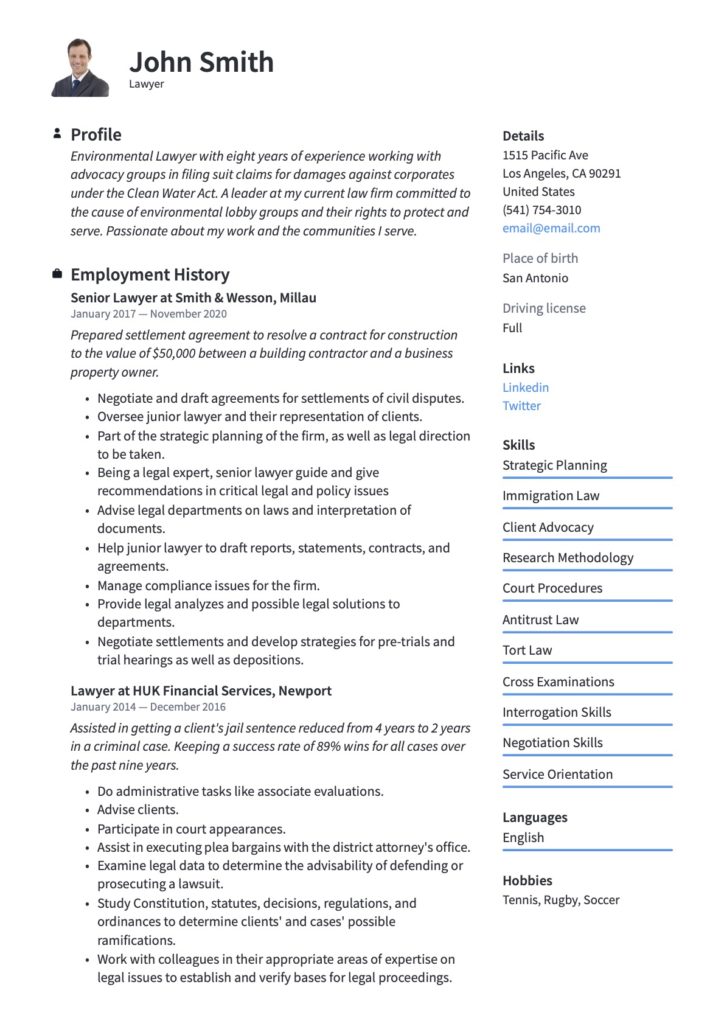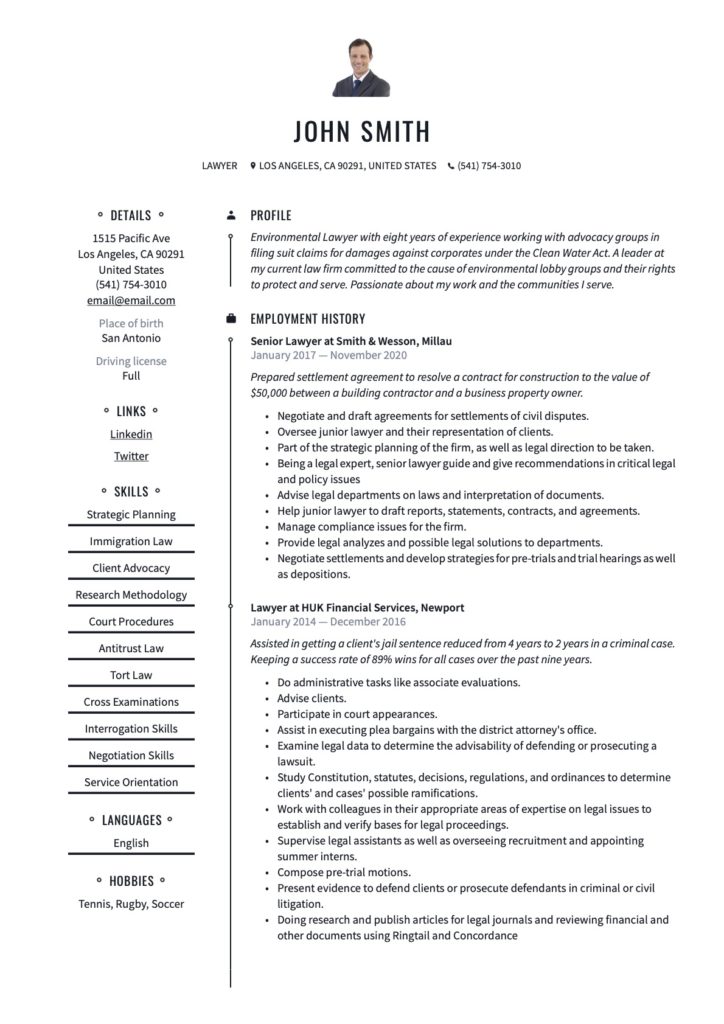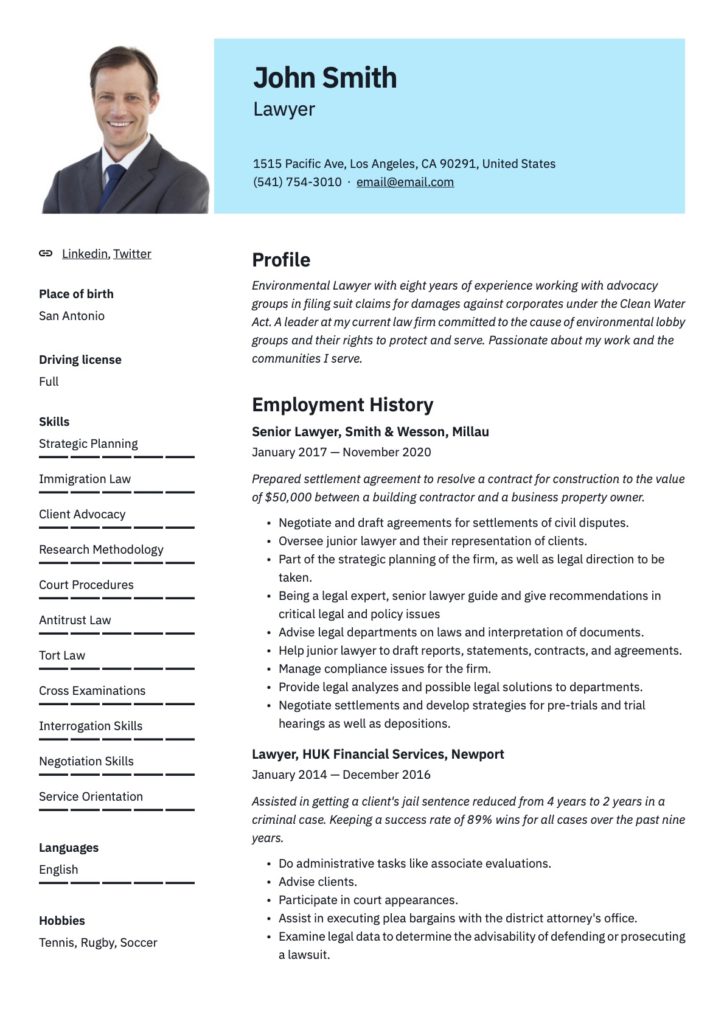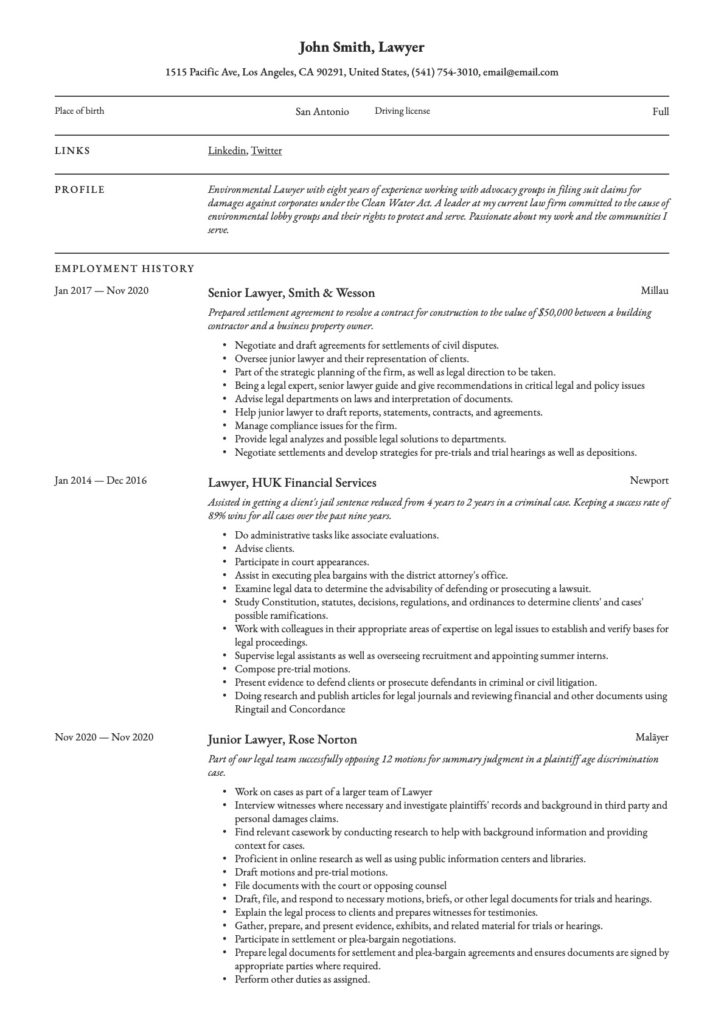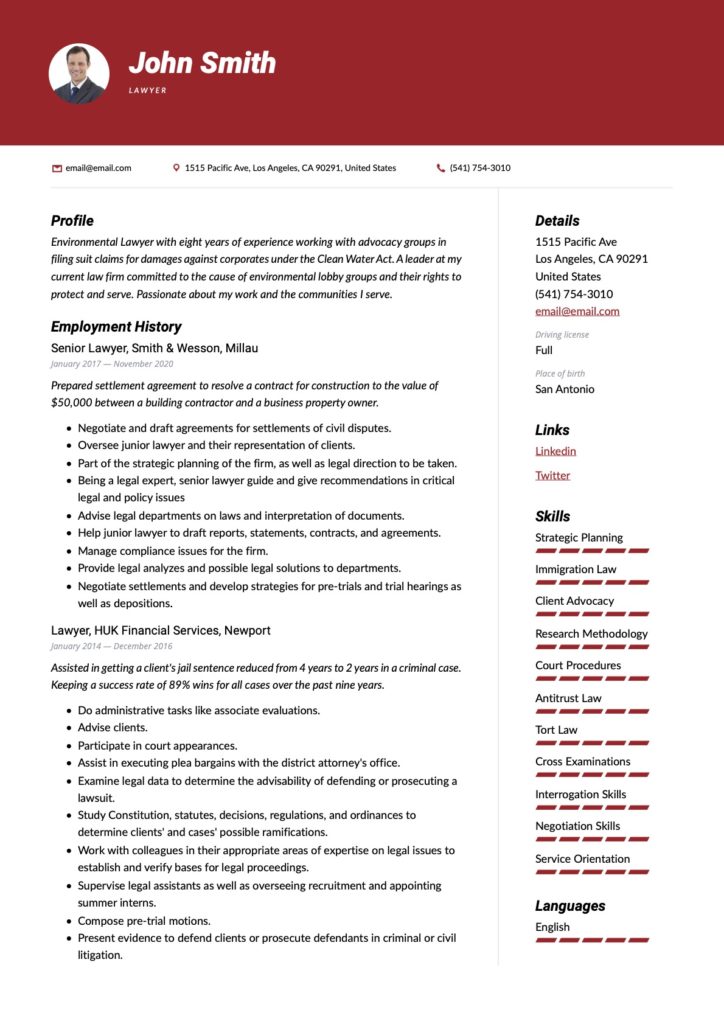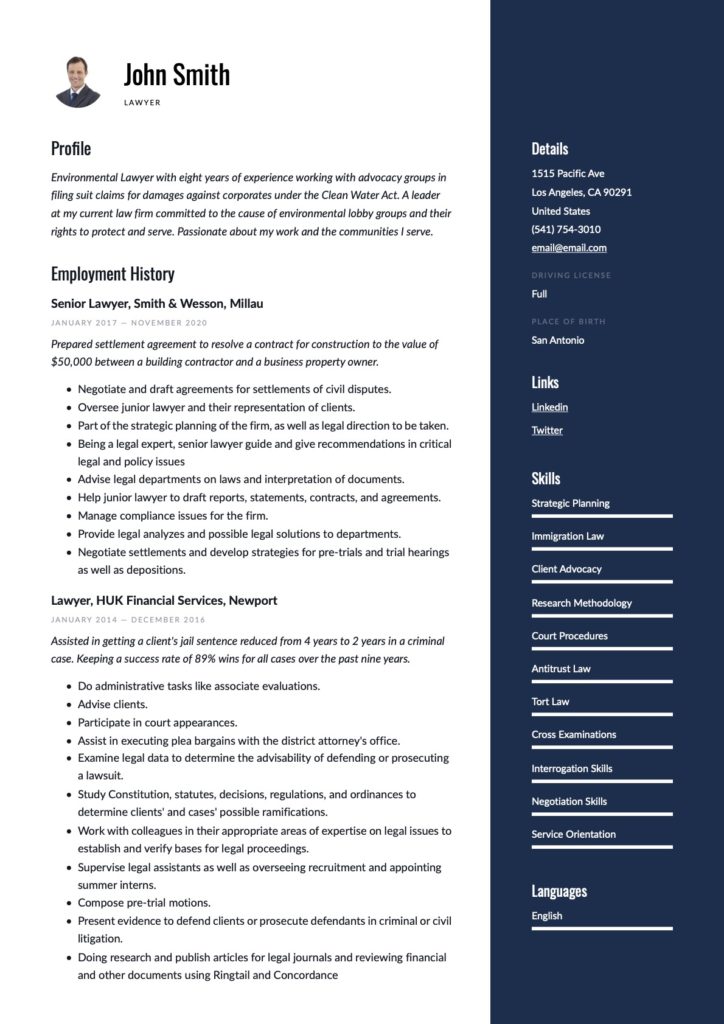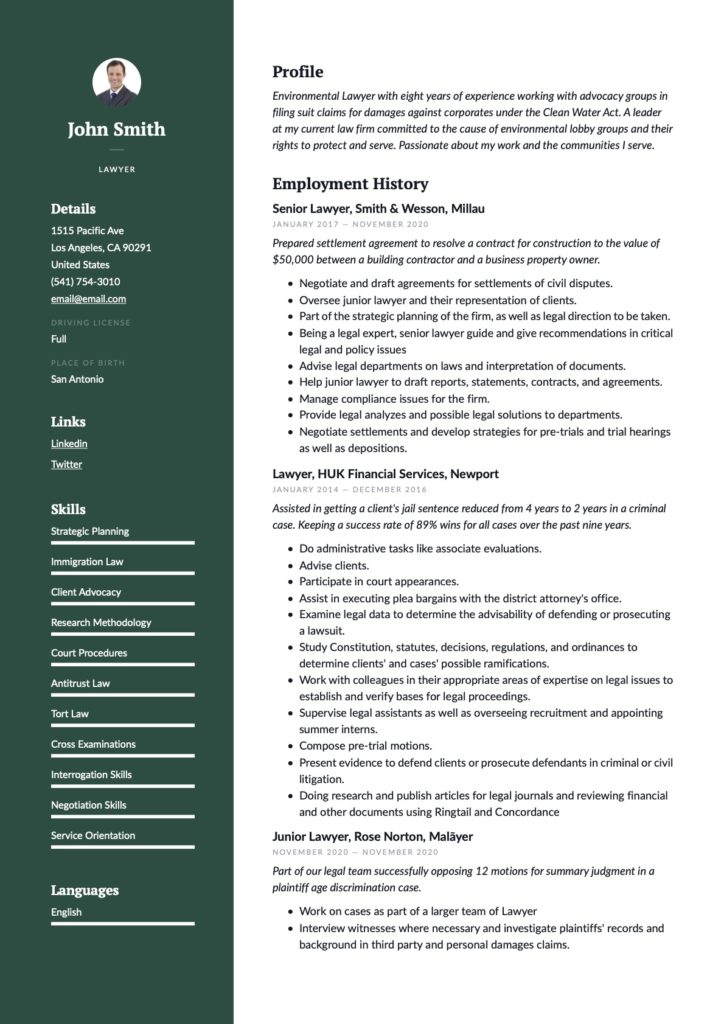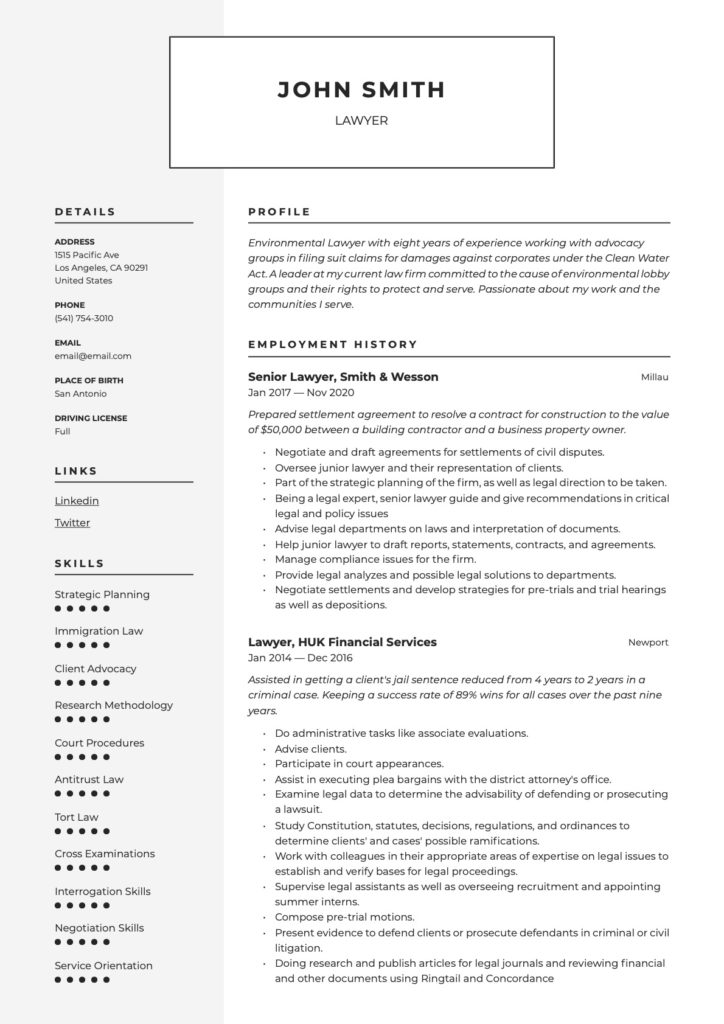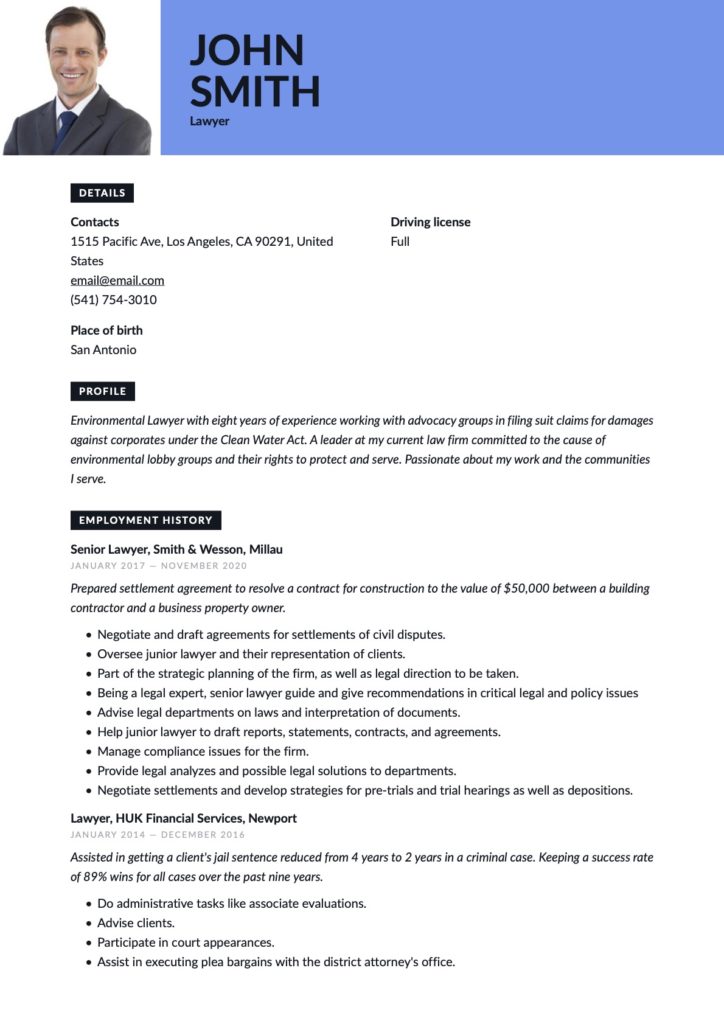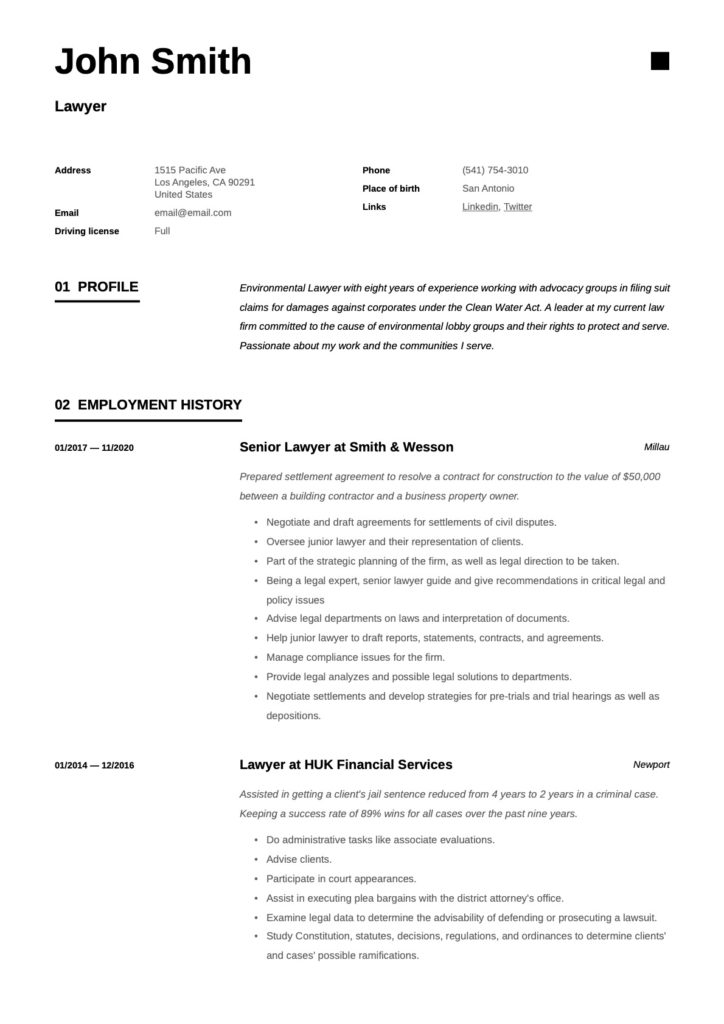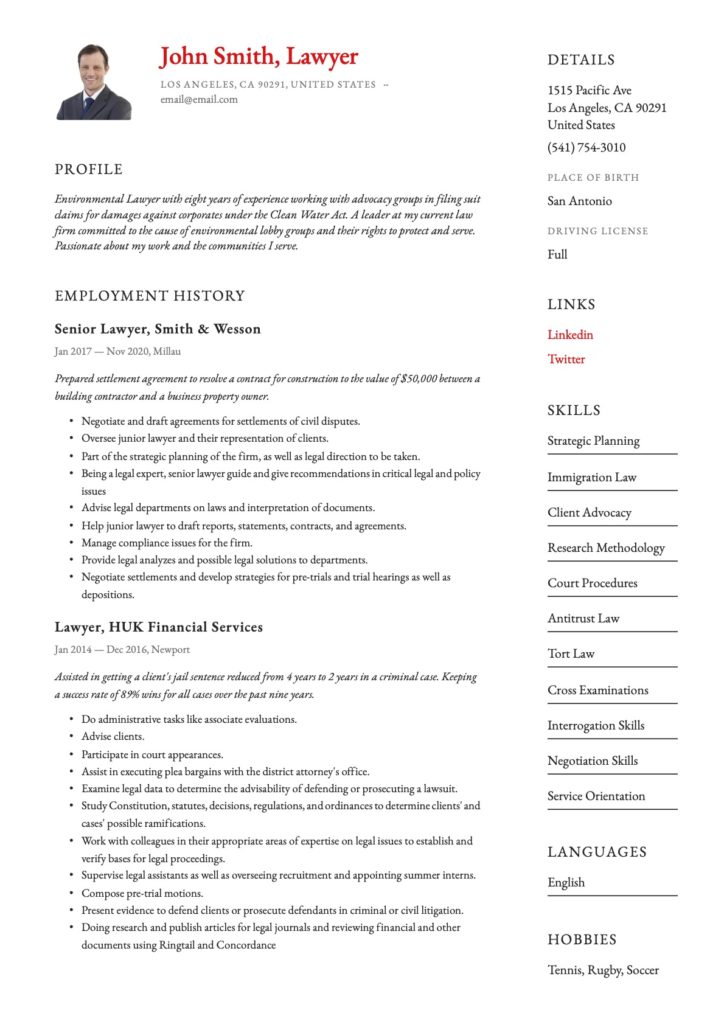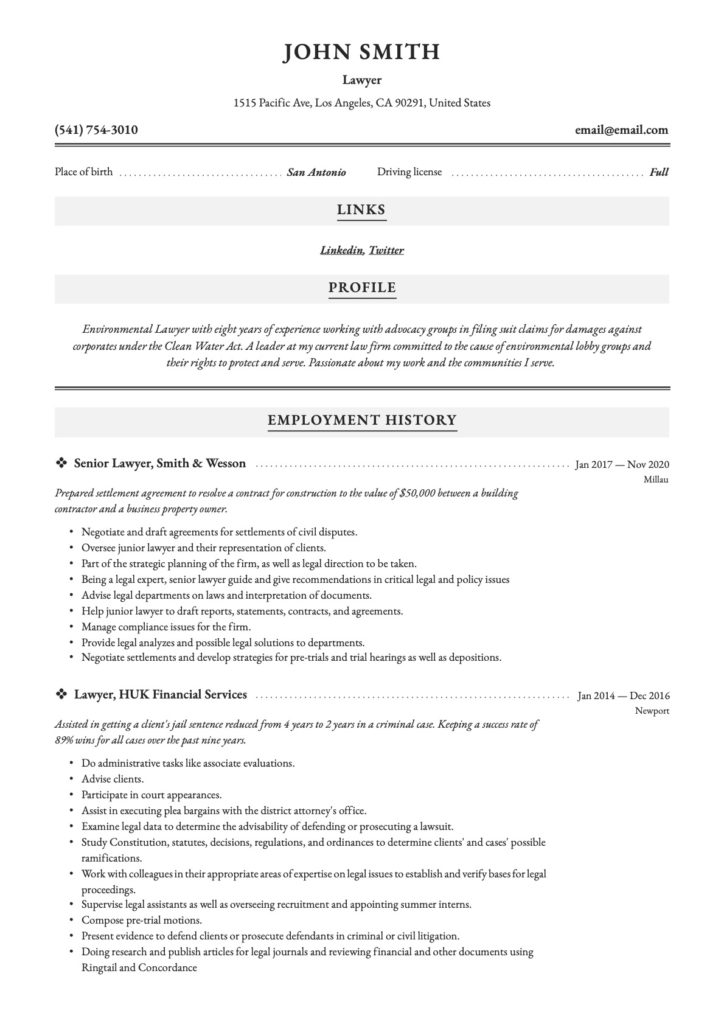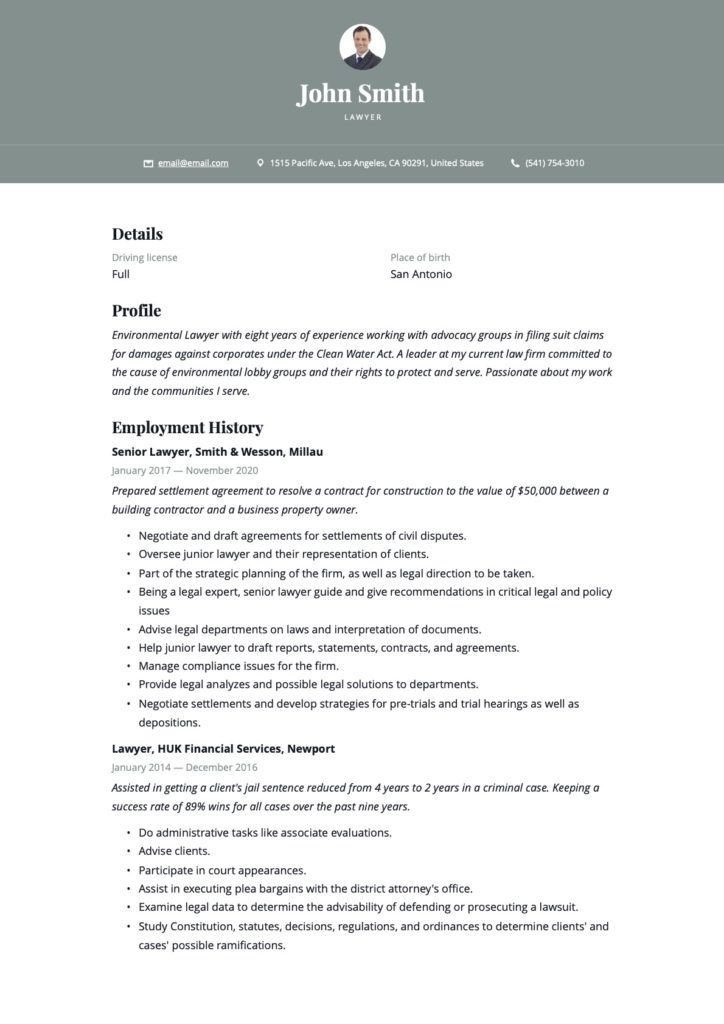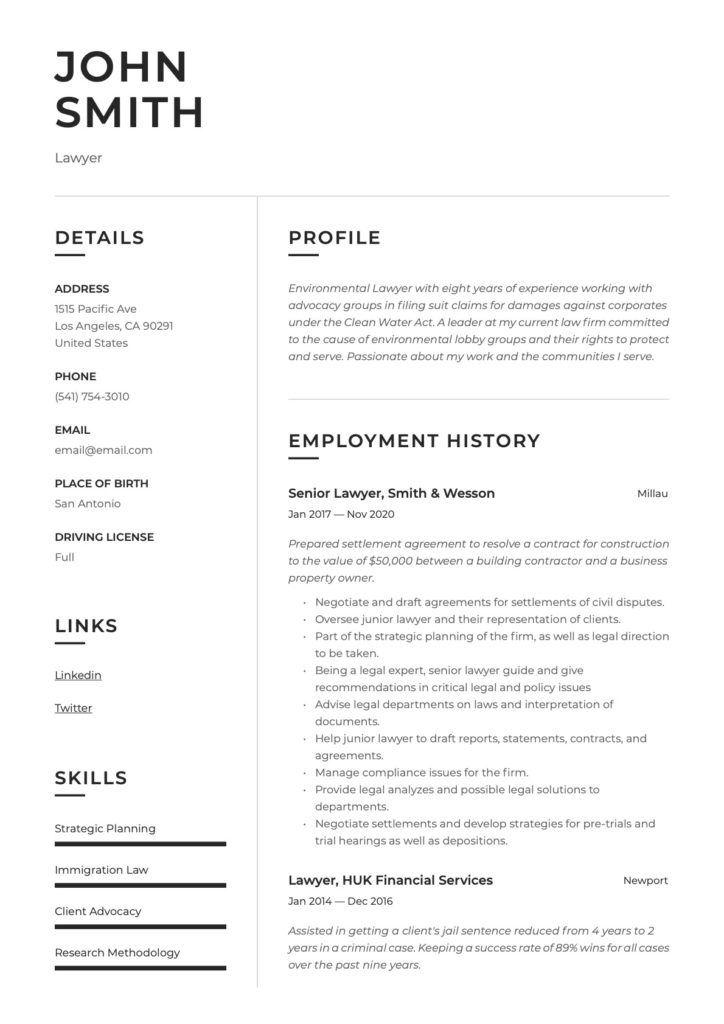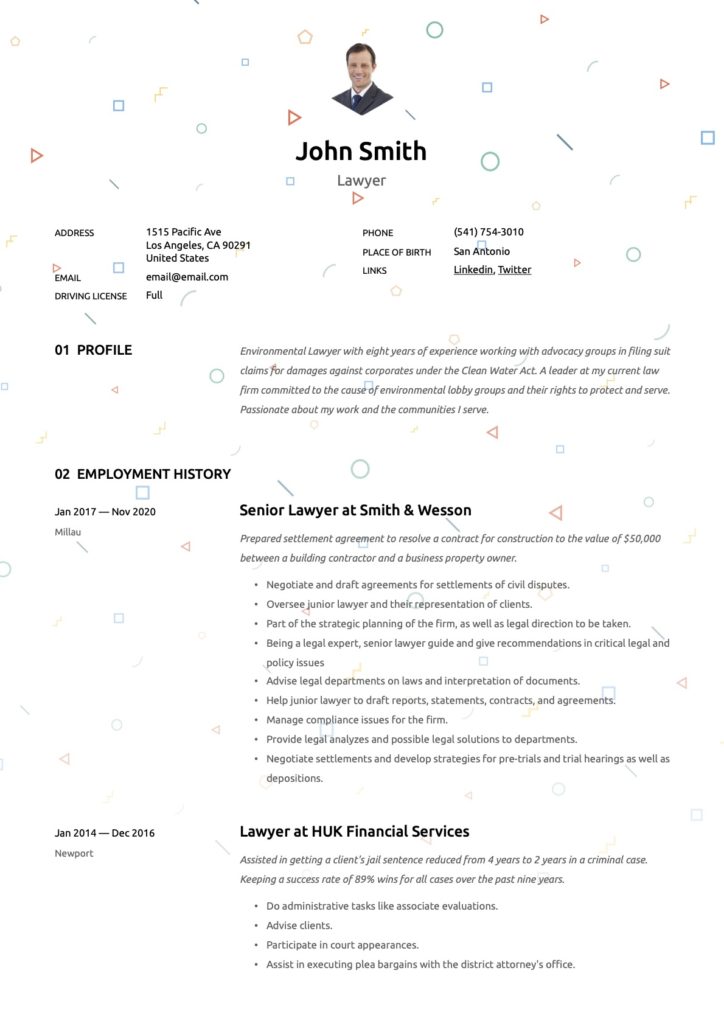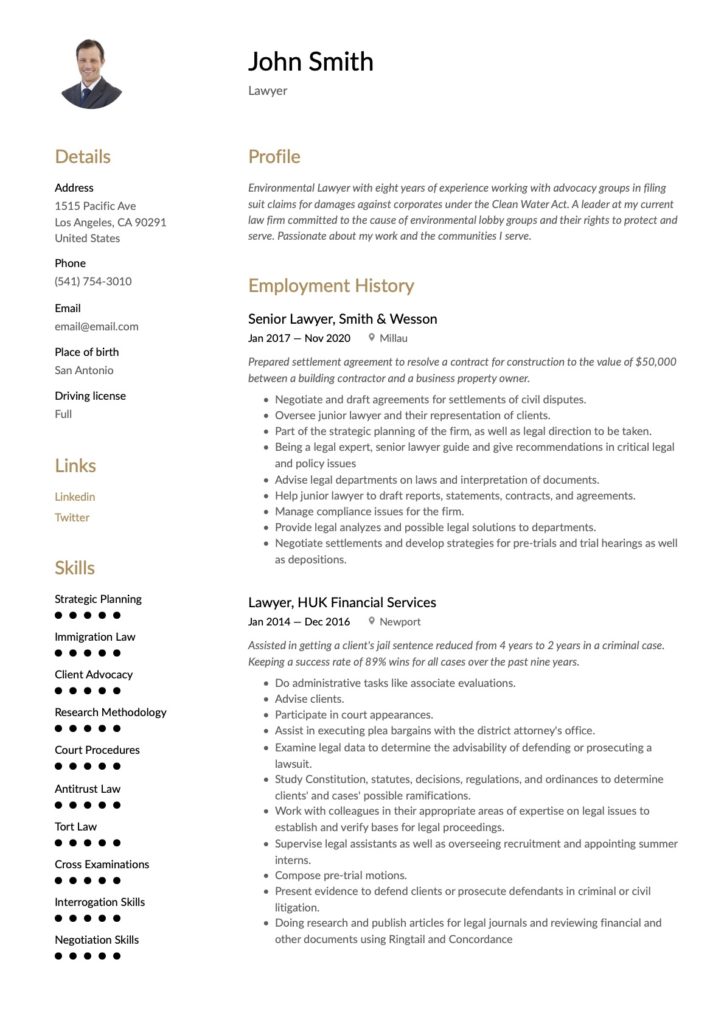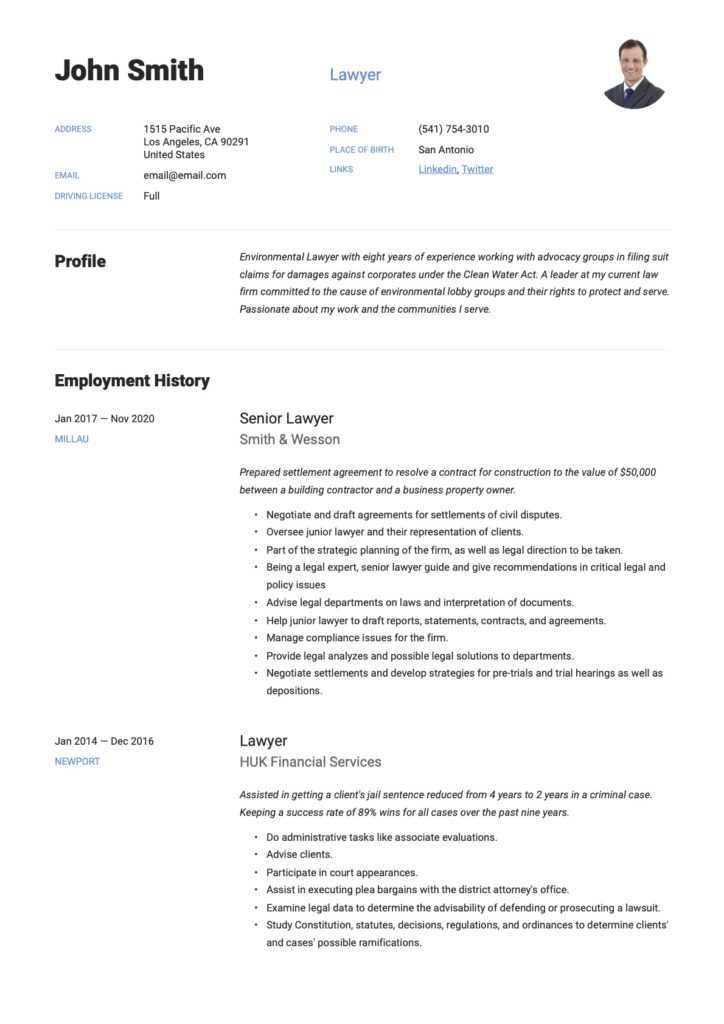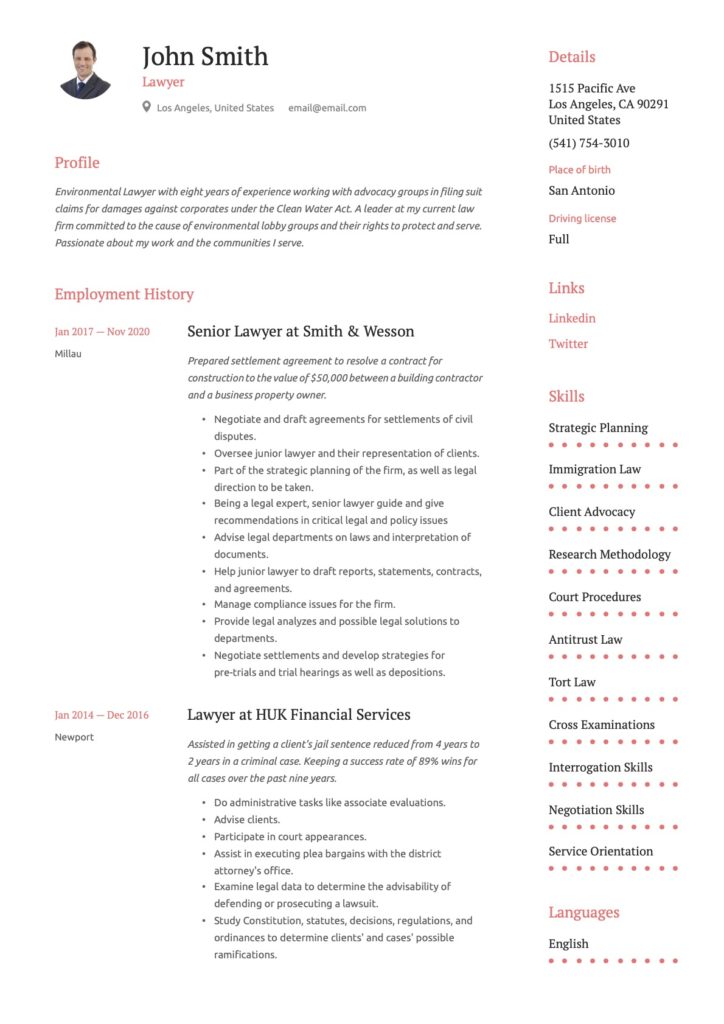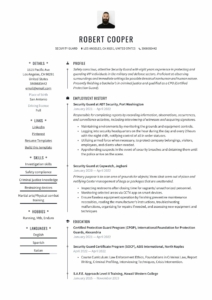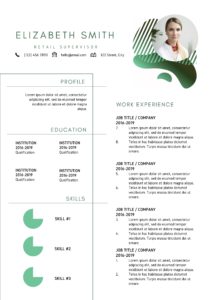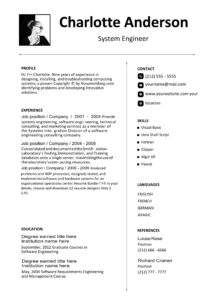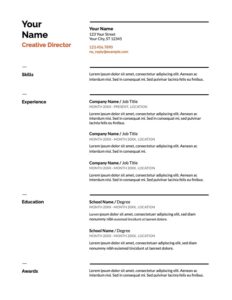The legal field is fascinating with many areas of expertise, but it is also a competitive career choice with supply often outweighing the demand.
Before building your stellar Lawyer Resume and sending it off to a law firm, review our samples of Lawyer Resumes, which may help you compile a substantial account of your working career.
Our Lawyer Resume write up below, is a thorough guiding document with templates, tips, and guidelines on how to write a resume that will win you an interview and give you an excellent chance of landing the position you are applying for.
What you can read in this article
Lawyer Resume Examples
(Free sample downloads are at the bottom of this page)
Lawyer Resume Writing Guide
Resume Sections
1. Contact Information:
- First Name
- Last Name
- Address
- Phone
- Optional: LinkedIn
2. Career Summary:
This is where you give the readers of your resume a glance of what they can expect to read about your career, so make it count. There are many fields of expertise in the legal fraternity. Make sure you highlight yours as well as the years of experience, for instance, in mergers and acquisitions. Write a short but to the point paragraph of your current position, explain your job's primary purpose, and mention why you would add value to their law firm. Use words and phrases to match the job listing and state specifically for which position you apply. List your expertise, qualifications, technical competencies, knowledge, skills, and experience, as well as relevant research and cases you were instrumental in. In a short sentence, mention your law school education, and don't forget to write about your co-curricular activities during student years, like debating and internships at law firms.
3. Qualifications Summary:
The minimum qualification for Lawyers is a Bachelor's Degree in Law. Lawyer also have to have a Juris Doctor (JD) degree from any law school accredited by the ABA (American Bar Association). You also need to pass the Bar Exam. Give a detailed account with accurate information about your qualifications with all institutions, for instance, qualification, name, and dates. Include other courses, certificates, and qualifications that you are in the process of completing.
4. Relevant Legal Experience:
Keep in mind that hiring managers don't necessarily want to read through endless lists, especially if it is not relevant for the job opening. Start with your most recent position and work your way back in time, but stick to short, direct sentences. Let the job description and responsibilities required guide you when you elaborate on your experience and value duties to the firm. If you don't have much experience, list relevant internships, apprenticeships, and volunteer work that applies to the position.
5. Skills Summary/Key Skills:
Study the job posting description to get a clear picture of the skills it will require. Be even more proactive and do your research on the firm by visiting their social media accounts and website. This will give you more insight into the type of people they employ.
6. Licenses/Certifications/Relevant Coursework/Training:
Lawyers have to pass their Law School Admissions LSAT exam, attend Law School, acquire the Juris Doctor (JD) degree and also pass the State Lawyer's Bar Exam for the state where you practice Law. It is expected of Lawyers to participate in professional development programs to help them stay on top of the game. Most law firms invest in these programs and encourage and expect their staff to participate. Give details of all relevant programs, seminars, and courses you were part of and state the dates, hours, and institutions' names in your resume in very much the same manner you listed your qualifications. If you are still attending or in the process of completing the above, give an estimated timeframe for when you expect to finish.
What to Highlight in an Lawyer Resume
As an Lawyer, you can have a profile ranging from defense, government counsels, corporate Lawyer, legal aid Lawyers, and many more. Lawyers also work in the private sector or a legal office, non-governmental organizations, and for the state, local and federal governments. Lawyers can specialize in environmental law, tax law, intellectual property, family law, and securities law.
Start this section with where you are now. For instance, are you working for a non-governmental organization, or are you a corporate Lawyer? It is essential to be clear about the legal environment you work in because of protocols and structures that differ. To work for a state office and consider moving to a government office can be a walk in the park for you because of similar structures and processes. The same goes for being a private Lawyer wanting to join a corporate law firm. But let the sky be your limit, so don't hesitate if you are a corporate Advocate wishing to apply for a state Lawyer position; it can be done.
Next is to explain the type of clients you are responsible for and the legal advice you give. You also need to provide details on your court exposure and the focus of your profile and position, be it business, individuals, etc. And where applicable, you can give a percentage exposure on, for example, the civil cases versus criminal cases. If you also mediate, list the number of cases as well as the topics of several cases. For instance, if you mediate in divorce settlements, give an exact number where possible.
Third on the list is to give an overview of your field of expertise as a Lawyer. Lawyers want to be known as experts in which they operate, and therefore your area of expertise or preference for a specific field has to be highlighted. There are many areas of expertise you can follow, but ultimately you will choose yours. Where applicable to the job posting, name a few areas where you have dipped your toe into, especially if you are a seasoned Advocate with many years on the clock. If you are fresh out of grad school and do not have a lot of experience or exposure, list all the fields you have had the opportunity to work in.
Lawyers can also be mediators, arbitrators, and conciliators. Arbitrator knows a lot about their specific industry. You are the impartial party that needs to hear and decide on disputes. Mediators help parties resolve their disputes, and conciliators do much of the same and guide the opposing parties to settle.
As mentioned, the legal field is vast, and its network is a far-reaching one into many areas of practice. To help you highlight your career and ensure you do not miss any advantage over other applicants, have a careful look at the list below to see which of these apply to your career history and will help your resume stand out.
Government:
Working for departments on local, federal, or state level, and can include working for the FBI!
Private Sector:
If you work in the private sector, it will most likely be for a law firm or private company.
Bankruptcy Law:
Reviewing financial information and documents, working for debtors and creditors.
Family:
Family Lawyers work with people and families. You focus on many legal issues, including working with child welfare cases, alimony, adoption, and divorce.
Securities:
You work in the financial industry's fast-paced environment, and your expertise reaches into the buying and selling of stocks, dividends disclosures, public offerings, regulations, and many more.
Tax Law:
Tax Law deals with the assessments and payments of taxes. Lawyers help by finding ways on how to impact the tax burden on individuals and companies. You can either work for the taxman or for people and companies that owe the taxman.
Business Law:
Working on issues that can impact business, also called ‘corporate and commercial' Lawyers. Areas can also include tax law, intellectual property, employment, contract, etc.
Criminal Law:
Working as prosecutors of defense Lawyers, spending much time in the courts.
Environmental:
Focusing on treaties, statutes, regulations, and conventions that can impact the environment. Your clients may include mines or advocacy groups as well as concerned citizens.
Intellectual Property:
Legal rights related to works and inventions and can include copyright, trademark, and patents.
Immigration:
Relates to citizenship, relocation (temporary or permanent) of individuals to and from one country to another, and helping with applications and proceedings. Immigration Advocate deal with volumes of paperwork and red tape in an ever-changing environment.
Personal Injury:
Be a legal representative to plaintiffs alleging physical or psychological injury due to acts, negligent or intentional, by other parties.
Estate Planning:
Working with clients' wills, deeds, trusts, and power of Lawyer applications. Lawyers help clients to structure their estate planning in the event of death or incapacitation.
Civil Rights:
Protecting people's civil rights, working with governments, nonprofits, and individuals.
Entertainment:
Working on contracts for copyright, trademarks, royalties, and intellectual property.
Employment:
Lawyers working with employment aspects focus on relationships between employers and employees.
Real Estate:
Dealing with legal issues related to property deals, including buying and selling, handling disputes and problems, work with lease deals, titles, foreclosures, compliance, and landlord-tenant matters.
End this section of your resume off by explaining what you do daily and include all your responsibilities for your current position that reflect the job advertisement. Remember to use keywords in the job posting, which matches your expertise and experience.
Hiring managers want to read about your accomplishments, such as depositions you chaired, cases you won, and litigation you were part of. If you have a good grip on the drafting of contracts and agreements, you can elaborate on it in this section, especially where your expertise is sought after and critical for the posting. If some of your work has been published and relevant to the position you apply for, make sure it is mentioned in this section. Also, mention your billable hours as well as targets that you exceeded in recent months.
*Cool Tips for a stellar resume:
Firms want to know if they can trust you and if it is worth their time, money, and effort to invest in you. Showing them, you are productive and your effectiveness and proficiency as a Lawyer will stand out on top of your schedule.
You also want to earmark the fact that no Lawyer is an island on its own, and therefore you don't always reinvent the wheel but make the most of existing knowledge.
For instance, you read reliable sources of information and published papers. You are part of your firm's mentoring program. You use relevant technology to help with fact findings and comb through the immense amount of information available.
Mention advanced search engines and tech tools that you use to help with your fact-finding quests. You need to show them you are well able to research legal issues effectively.
Don't get disgruntled if you apply for your first job as an Lawyer/Advocate with little formal experience to stand out above the crowd of job seekers.
Let this list guide you to highlight relevant information in your resume:
- Internships, clinics, seminars, and mentorship programs you attended.
- Volunteer work during your years of study, even as far back as high school.
- If you were an assistant during your studies, list the relevant jobs you held.
- List part-time positions, like summer internships
- Highlight your GPA scores if above 3.5
- Mention moot court competitions you were part of.
- Interview Lawyers in the field of expertise that you are interested in.
- Writing skills are fundamental in the law profession. If you have excellent written skills or participated in writing competitions, mention this!
- On the topic of writing, start writing blogs on the Law, try to get published, and submit papers and research to relevant media.
- Participate in Toastmasters; you want to improve your public speaking skills.
- Attending Bar sponsored continuing legal education (CLE) programs to meet local Lawyers practicing in areas of interest.
Lawyer Career & Resume Profile Summary
You want to attract the hiring managers' attention as soon as possible, especially when there are many resumes they have to screen. Often hiring managers will skip straight to career summaries when they need to identify candidates they want to interview.
Think about this section as an opening statement you present in court. To make a strong case for yourself, let essential facts about your working experience, skills, interpersonal traits, experience, achievements, and qualifications speak on your behalf. Keep in mind that your resume's audience might not be proficient in legal issues, jargon, and vocabulary. You also need to write in layman terms.
Your career summary needs to grab their attention by being to the point and leaving a lasting impact on the reader. They need to read about the benefits and value you will bring to their organization.
Example Profile Summaries:
'A Lawyer with three years of experience in legal research to provide fact-based evidence. Proficient in drafting and registering legal documents, contracts, and appeals. Effective in resolving client disputes and negotiating plea agreements to represent clients successfully in court cases. Finished top five at Law School and succeeded at first attempt for the Bar Admission Exam.'
'A goal-focused family Lawyer with more than five years' experience in divorce and alimony cases. I am seeking to leverage proven trial, preparation, and negotiation skills. I maintain 1 300 billable hours/year and average client satisfaction of 92%. I Managed 28 cases to trial and settled 18 mediations.'
'Environmental Lawyer with eight years of experience working with advocacy groups in filing suit claims for damages against corporates under the Clean Water Act. A leader at my current law firm committed to the cause of environmental lobby groups and their rights to protect and serve. Passionate about my work and the communities I serve.'
Lawyer Job Descriptions, Responsibilities, and Duty Examples
You completed your Juris Doctor degree and passed the bar exam. There are many fields you can follow as a Lawyer. Usually, there is a standard progression in law firms that employees follow to climb the career path ladder. With your degree in hand, you will start at a law firm as an associate and be eligible for a partner position after being with the firm between six to nine years. Some Lawyers decide to start their firm to gain experience faster and on their terms. Below are three job descriptions for various career stages of an Lawyer:
The lawyer I at entry-career stage (3-5 years experience) may:
- Work on cases as part of a larger team of Lawyers.
- Interview witnesses where necessary and investigate plaintiffs' records and background in third-party and personal damages claims.
- Find relevant casework by conducting research to help with background information and providing context for cases.
- Proficient in online research as well as using public information centers and libraries.
- Draft motions and pre-trial motions.
- File documents with the court or opposing counsel
- Prepare and handle pleas, motions, and depositions.
- Attend depositions
- Attend case management meetings, pre-trial discussions, and motion hearings.
- Help with quality control, for instance, with the preparation of privilege and redaction logs.
- Evaluate assigned cases or lawsuits by reviewing documentation, researching applicable laws, gathering evidence, and determining the most appropriate action(s) to be taken.
- Draft, file, and respond to necessary motions, briefs, or other legal documents for trials and hearings.
- Explain the legal process to clients and prepares witnesses for testimonies.
- Gather, prepare, and present evidence, exhibits, and related material for trials or hearings.
- Participate in settlement or plea-bargain negotiations.
- Prepare legal documents for settlement and plea-bargain agreements and ensures documents are signed by appropriate parties where required.
- Perform other duties as assigned.
Lawyer II at the mid-career stage (5-8 years' experience) may:
- Have a more direct responsibility when working with clients.
- Do administrative tasks like associate evaluations.
- Advise clients.
- Participate in court appearances.
- Assist in executing plea bargains with the district Lawyer's office.
- Examine legal data to determine the advisability of defending or prosecuting a lawsuit.
- Study Constitution, statutes, decisions, regulations, and ordinances to determine clients' and cases' possible ramifications.
- Work with colleagues in their appropriate areas of expertise on legal issues to establish and verify bases for legal proceedings.
- Supervise legal assistants as well as overseeing recruitment and appointing summer interns.
- Compose pre-trial motions.
- Present evidence to defend clients or prosecute defendants in criminal or civil litigation.
- Doing research and publish articles for legal journals and reviewing financial and other documents using Ringtail and Concordance.
Lawyer III at experienced/advanced stage (8-15 years experience) may:
- Select jurors, argue motions, meet with judges, and question witnesses during trials.
- Act as agent, trustee, guardian, or executor for businesses or individuals.
- Attend legal conferences as well as being a keynote speaker.
- Provide legal guidance to clients as well as support to high-level clients.
- Represent high-level clients in court.
- Negotiate and draft agreements for settlements of civil disputes.
- Oversee junior Lawyers and their representation of clients.
- Part of the strategic planning of the firm, as well as legal direction to be taken.
- Being a legal expert, senior Lawyers guide and give recommendations in critical legal and policy issues
- Help junior Lawyers to draft reports, statements, contracts, and agreements.
- Provide legal analyzes and possible legal solutions to departments.
- Negotiate settlements and develop strategies for pre-trials and trial hearings as well as depositions.
Highlight Your Accomplishments
Your accomplishments as an Lawyer is an individual expression of who you are.
One of the main goals when telling the story of your accomplishments is to land an interview for the job you apply for. Highlight your most significant achievements that will single out your considerable successes.
Stick to the most relevant accomplishments for the position and use action verbs for each statement. Make sure you use numbers and percentages where applicable. For instance, you supervised ten legal aids.
Remember, this is not a section to write about your job duties and responsibilities; you want to set yourself apart by bragging a bit about your professional accomplishments.
Here a few examples to get you started:
- I researched and drafted a successful motion to suppress evidence in a criminal case, resulting in several charges against the client dismissed.
- Prepared settlement agreement to resolve a contract for construction to the value of $50,000 between a building contractor and a business property owner.
- Assisted in getting a client's jail sentence reduced from 4 years to 2 years in a criminal case.
- Keeping a success rate of 89% wins for all cases over the past nine years.
- Instrumental in landing a top client, one of the largest building companies in the state, for the firm.
- I compiled and prepared over 800 pre-trial briefs.
- Part of our legal team successfully opposing 12 motions for summary judgment in a plaintiff age discrimination case.
Lawyer Education Section
Hiring managers will scrutinize this section regardless of the place in your CV. Your academic record is a vital part of your career path and background as an Lawyer. It will also indicate whether you have taken part in continuous legal programs and development activities to enhance your career further.
Your qualification list needs to answer the “What, Where, When” questions about your qualifications, licenses, certifications, and diplomas. Keep the list sweet and short so that the reader can easily navigate through the years of education.
Education section Examples:
2012 – 2015: Master of Laws (LL.M.) Human Rights & Comparative Constitutional Law, Yale University, CT
November 2008: Licensed Lawyer Bar Admissions: State of New York, NY
2004 – 2007: Juris Doctor – New York Law School, State of New York, NY
GPA: 3.8
2000 – 2004: Bachelor in Economics, New York University, NY
What to Write in a Lawyer Resume Skills Section
Your application will attract the trained eye when your specific skills set is close to a perfect match to those mentioned in the job posting but be truthful because this gives credibility to your application. The smartest way to present technical and interpersonal skills is in table format such as the ones below:
Technical Skills:
| Business Acumen | Law Knowledge | Conveyancing |
| Appeals | Trial Preparation | Litigation |
| Depositions | Antitrust Law | Client Service |
| Case Strategies | Client Management | Upselling |
| Draft Legal Documentation | Wills, Estates, Trusts | Product Liability Law |
| Power of Lawyer | Settlement Meetings | Tort Law |
| Mediation | Court Procedures | Cross Examinations |
| Client Advocacy | Project Management | Corporate Law |
| Legal Advice | Reference Literature | Interrogation Skills |
| Research Methodology | Drafting Opposition Papers | Mergers and Acquisitions |
Interpersonal Skills:
| Good Memory | Collaboration | Persistence |
| Negotiation Skills | Service Orientation | Loyal |
| Good Vocabulary | Excellent Reasoning Skills | Disciplined |
| Communications | Public Speaking | Integrity |
| Prioritize | Presentations | Logical Thinking |
| Active Listening | Trustworthy | Handling Pressure |
| Leadership | Writing Skills | Empathy |
| Analytical Thinking | Attention to detail | Objective |
| Teamwork | Persuasiveness | Sound Judgement |
| Time Management | Problem Solving | Goal Orientated |
Qualifications/Certifications associated with Lawyers
| Doctor/Master of Public Policy or Juris Doctor/Master of Public Administration | Juris Doctor (JD) | Master of Laws (LLM) |
| Doctor of Jurisprudence (JSD) | Business Law Diploma | NALA Advanced Certified Paralegal (ACP) |
| Doctor of Comparative Law (DCL) | Doctor of Juridical Science (SJD) | Doctor of Philosophy in Law (Ph.D.) |
| Passed Bar Exams (Indicate States) | CLE – Continuous Legal Education | eDiscovery Digital Research Certification |
| Master of Legal Studies | Master of Dispute Resolution | Certificate In Cyber Security Law |
Professional Information for Lawyers
Sectors: Various
Career Type: Legal, Prosecution, Litigation, Conveyancing, Public Defense, Private Advisory, Counselling, Bargaining
Person type: Counselor, Advisor, Prosecutor, Judge, Researcher, Adjudicator, Drafter, Mediator, Representor, Arguer, Interpreter, Investigator, Vetter, Processor, Judiciary, Presenter, Communicator, Investigator, Reporter, Verifier, Creator, Processor, Vetter
Education levels: Bachelor's to Master's Degree
Salary indication: $952 873 per year Indeed
Labour market: Estimated 6% growth between 2018 – 2028
Organizations: SME, Corporate, Fortune 500, NPO, Commercial, Government
